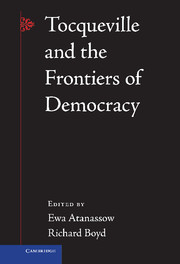Book contents
- Frontmatter
- Contents
- List of Contributors
- Short Title Abbreviations of Tocqueville's Major Works
- Acknowledgments
- Introduction: Tocqueville and the Frontiers of Democracy
- Part One The Meaning of Democracy and the Democratic Revolution
- 1 Democracy and Revolution in Tocqueville: The Frontiers of Democracy
- 2 The Frontier Between Aristocracy and Democracy
- 3 Tocqueville's Burke, or Story as History
- Part Two Democratization in a Non-Western Context
- Part Three Challenges of Globalization: Democracy, Markets, and Nationhood
- Part Four Democracy, Imperialism, and Foreign Policy
- Part Five Democracy's Old and New Frontiers
- Epilogue: New Frontiers, Old Dilemmas
- Bibliography of Works Cited
- Index
- References
2 - The Frontier Between Aristocracy and Democracy
Published online by Cambridge University Press: 05 April 2013
- Frontmatter
- Contents
- List of Contributors
- Short Title Abbreviations of Tocqueville's Major Works
- Acknowledgments
- Introduction: Tocqueville and the Frontiers of Democracy
- Part One The Meaning of Democracy and the Democratic Revolution
- 1 Democracy and Revolution in Tocqueville: The Frontiers of Democracy
- 2 The Frontier Between Aristocracy and Democracy
- 3 Tocqueville's Burke, or Story as History
- Part Two Democratization in a Non-Western Context
- Part Three Challenges of Globalization: Democracy, Markets, and Nationhood
- Part Four Democracy, Imperialism, and Foreign Policy
- Part Five Democracy's Old and New Frontiers
- Epilogue: New Frontiers, Old Dilemmas
- Bibliography of Works Cited
- Index
- References
Summary
There is no more telling illustration of the elusive frontier between aristocracy and democracy than Tocqueville's own fate as a private person, as a public figure, and as a political author. Tocqueville is an aristocrat by heritage, manners, and inclinations and a democrat by reason, by political clairvoyance. This is precisely why he was destined to remain a solitary figure in the agitated drama of French political passions: too democratic for the royalist camp, too prone to endorse equality for the reactionary party, much too aristocratic for many of the Republican heirs of 1789, and a plain counterrevolutionary for the Bonapartists who were incensed by his damning portrayal of Napoleon. Tocqueville's reflections on the fading fortune of aristocracy, on the irresistible course of the democratic process but also on the dangers this process posed to individual liberty and the very idea that “equality of condition” was the “generative fact” of modern society – these very unorthodox propositions – confined him to the rather lone eminence he was to experience throughout his public life, for they disproved the certitudes – and prejudices – of nearly every single political party of his day.
Tocqueville's interpretation, to begin with, upholds a fundamental premise that has long remained foreign to the French political tradition: following Montesquieu, he acknowledges the prevalence of mores over laws and political institutions in shaping the general spirit of a nation. “Mores and manners,” cautioned Montesquieu, “are usages that laws have not established, or that they have not been able, or have not wanted to establish.” For they belong to two different realms: the laws appertain to the legislator, whereas mores and manners, to the nation in general.
- Type
- Chapter
- Information
- Tocqueville and the Frontiers of Democracy , pp. 53 - 73Publisher: Cambridge University PressPrint publication year: 2013
References
- 3
- Cited by

